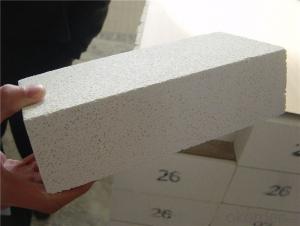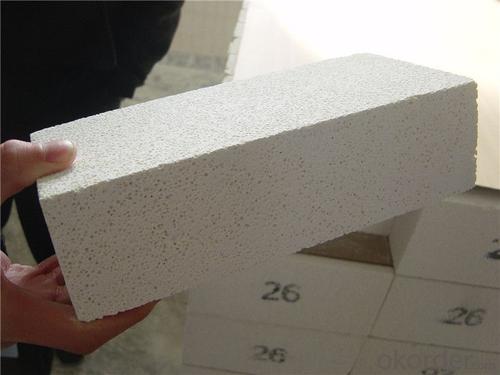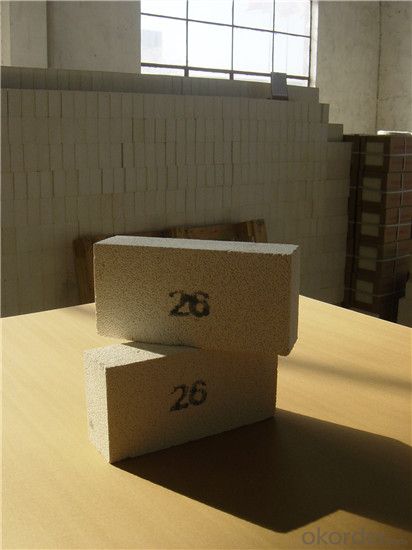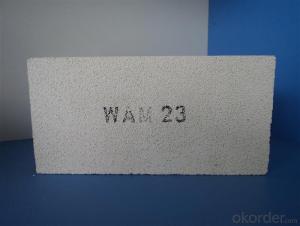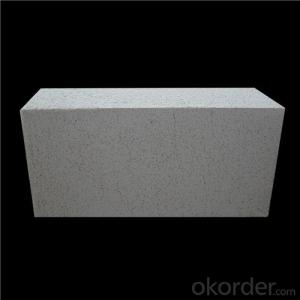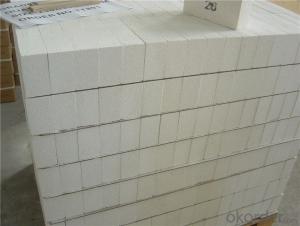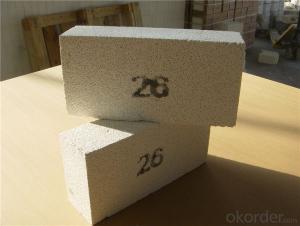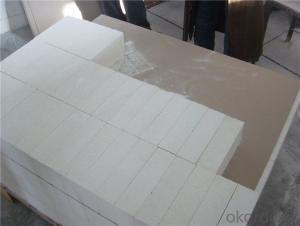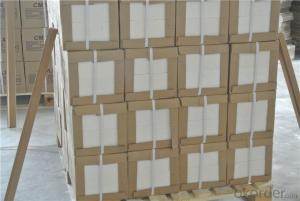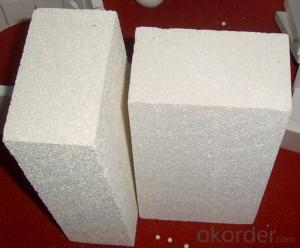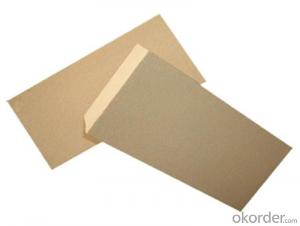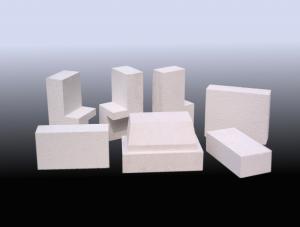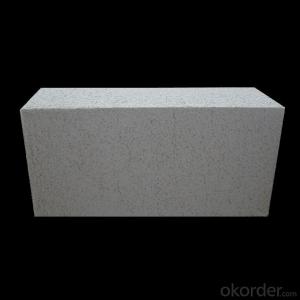Insulating Fire Brick - GJM 28 Light Dense Mullite Insulation Brick
- Loading Port:
- Shanghai
- Payment Terms:
- TT OR LC
- Min Order Qty:
- 1 m.t.
- Supply Capability:
- 10000 m.t./month
OKorder Service Pledge
OKorder Financial Service
You Might Also Like
Thermal Insulation Fire Clay Brick
Refractory brick is a refractory material used in lining furnaces, kilns, fireboxes, and fireplaces.
We provide high quality Refractory Fire Bricks that are used on wide range in the various industries like Cement, Glass and Steel. Refractory Fire Bricks are provided as per the quantity and specifications required by the customers. We provide an extensive range of Refractory Fire Bricks at reasonable prices that depend upon the quantity ordered.
Application
Insulating Fire Brick are used for the lining of converter, alternating current arc furnace, direct Current arc furnace and the ladle slag line, etc.
Company Advantage
(1)Long Insulating Fire Brick manufacture history: 25 years manufacturer
(2)Advanced equipment and good service
(3)Diversification of production standards: ISO ANSI FEPA JIS ASTM
(4)Flexible payment: T/T L/C D/P D/A
(5)Professional marketing team and after-sale service
Insulating Fire Brick main feature:
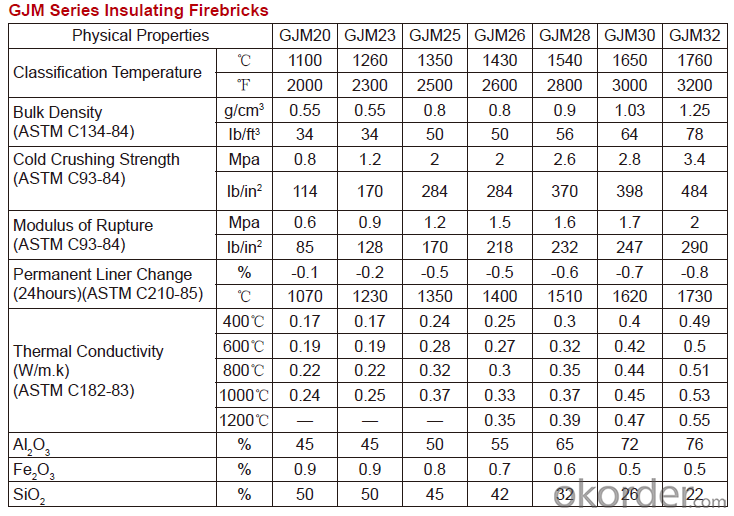
Equipment
1 unit of Ceramic Abrasive (SG Abrasive) pilot production line
2 units of Compact grain Abrasive pilot production lines
1 unit of high-end coated abrasives (abrasive cloth) production line
3 large flexible crushing and sieving lines for grit production lines
6 units of 5000KVA-10000KVA dumping type electric arc furnaces for Brown Fused Alumina fusion
FAQs
Q1 What’s the transport method?
A1 FCL delivery goods with wooden pallet or wooden case by sea; If LCL delivery, must with wooden case; Sometimes need open top, flat rack or bulk cargo.
Q2 What’s the required payment term?
A2 Generally 30% TT as the prepayment, 70% TT before delivery. If need, 100% Irrevocable Letter of Credit or negotiation.
Q3 Which country are our products exported to?
A3 Apart from entire Chinese market, the US, Russia, Japan, Korea, Australia and some Southeast Asian Nations.
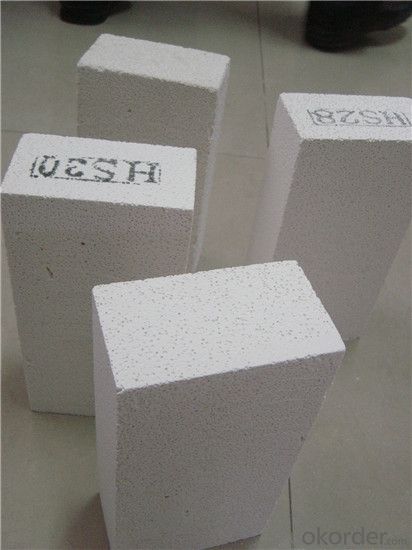
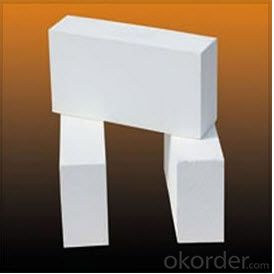
- Q: Refractory bricks, burner bricks, insulation bricks? Is it a kind of thing?
- Not the same thing, refractory bricks and insulation bricks of raw materials, the proportion is not the same. This is the chain of various types of products
- Q: Are insulating fire bricks suitable for outdoor applications?
- Insulating fire bricks are generally not suitable for outdoor applications. These bricks are designed to be used in high-temperature environments such as kilns, furnaces, and other industrial applications. They have excellent thermal insulation properties and can withstand very high temperatures. However, insulating fire bricks are not designed to withstand exposure to the elements and can be easily damaged by moisture, rain, and extreme weather conditions. They are not resistant to freezing and thawing cycles, which can cause them to crack and break. For outdoor applications, it is recommended to use fire bricks that are specifically made for outdoor use. These bricks are usually made of dense clay or other materials that can withstand moisture and weather conditions. They are more durable and can provide better protection against the elements. It is important to consider the specific requirements and conditions of your outdoor application before choosing the appropriate type of fire bricks. Consulting with a professional or supplier knowledgeable in fire bricks can help ensure that you select the right product for your needs.
- Q: Can insulating fire bricks be used for insulation in ovens?
- Yes, insulating fire bricks can be used for insulation in ovens. Insulating fire bricks are specially designed to withstand high temperatures and provide excellent insulation properties. They have a low thermal conductivity, which means they can effectively retain heat and prevent it from escaping the oven. This helps in maintaining a consistent temperature inside the oven, ensuring efficient and even cooking. Additionally, insulating fire bricks are resistant to thermal shock, meaning they can handle rapid temperature changes without cracking or breaking. Therefore, using insulating fire bricks for oven insulation is a practical and effective choice.
- Q: The insulation layer destroyed after use of cement paste and tiling
- The most certain and the method can increase the area of the balcony is to eradicate the insulation layer exposed after cement wall tiles.
- Q: Can insulating fire bricks be used in industrial furnaces?
- Yes, insulating fire bricks can be used in industrial furnaces. Insulating fire bricks are specifically designed to withstand high temperatures and provide excellent insulation properties. They are made from lightweight refractory materials, such as alumina, silica, or mullite, which have low thermal conductivity. This allows them to efficiently trap heat within the furnace, reducing heat loss and improving energy efficiency. In industrial furnaces, where high temperatures are required for various processes like metal melting, glass manufacturing, or ceramic production, insulating fire bricks can be used to line the inner walls and floor of the furnace. Their insulation properties help to maintain a consistent temperature inside the furnace, ensuring optimal conditions for the industrial process. Insulating fire bricks also have the advantage of being lightweight, which makes them easier to handle and install compared to traditional dense fire bricks. This can save time and labor costs during the construction or repair of industrial furnaces. However, it is worth noting that the specific type and composition of insulating fire bricks should be carefully selected based on the operating temperature and requirements of the industrial furnace. Different types of insulating fire bricks have different temperature limits and resistance to thermal shock. Therefore, consulting with a professional or a refractory expert is recommended to ensure the right selection and installation of insulating fire bricks in industrial furnaces.
- Q: Are insulating fire bricks suitable for use in carbon black furnaces?
- Yes, insulating fire bricks are suitable for use in carbon black furnaces. These bricks are known for their high insulation properties, which help in maintaining high temperatures inside the furnace while preventing heat loss. Additionally, insulating fire bricks are designed to withstand extreme temperatures and chemical reactions, making them a suitable choice for carbon black furnaces that operate under high heat and harsh conditions.
- Q: Can insulating fire bricks be used in the construction of pottery extruders?
- Yes, insulating fire bricks can be used in the construction of pottery extruders. Insulating fire bricks are known for their high heat resistance and insulation properties, making them ideal for applications involving high temperatures, such as pottery kilns and extruders. These bricks can withstand the intense heat generated during the pottery extrusion process, ensuring the longevity and durability of the extruder. Additionally, their insulation properties help to maintain a consistent temperature within the extruder, which is crucial for achieving precise and consistent results in pottery production. Therefore, using insulating fire bricks in the construction of pottery extruders is a reliable and effective choice.
- Q: Can insulating fire bricks be used in fireplace construction?
- Yes, insulating fire bricks can be used in fireplace construction. They are designed to withstand high temperatures and provide excellent insulation, making them a suitable choice for building fireplaces.
- Q: Can insulating fire bricks be used in biomass power plants?
- Insulating fire bricks possess the capability to be utilized within biomass power plants. Specifically designed to endure extreme temperatures and offer insulation, these fire bricks are well-suited for an array of applications in high-temperature settings, including biomass power plants. These power plants generate electricity by incinerating biomass materials such as wood chips, agricultural waste, and other organic substances. The usage of insulating fire bricks can span across multiple areas within a biomass power plant. Primarily, they can be employed to line the combustion chamber where the biomass is burned, releasing heat. The insulating properties of these bricks aid in containing the heat within the combustion chamber, thereby enhancing the efficiency of the biomass combustion process. Furthermore, insulating fire bricks serve a purpose in the construction of the plant's boiler, responsible for converting the heat produced by the biomass incineration into steam. The bricks can be utilized to line the walls and roof of the boiler, delivering thermal insulation and preventing heat loss. This insulation serves to maintain high temperatures inside the boiler, which is vital for steam generation and subsequent power production. Moreover, the construction of the chimney or flue system of biomass power plants can also incorporate insulating fire bricks. These bricks can be utilized to line the interior of the chimney, ensuring that the high temperatures and corrosive gases resulting from biomass combustion are safely contained and directed out of the plant. In summary, insulating fire bricks are an exceptional choice for biomass power plants due to their ability to withstand high temperatures and provide thermal insulation. Their utilization in the combustion chamber, boiler, and chimney systems contributes to the improvement of efficiency and safety in biomass power generation.
- Q: Are insulating fire bricks resistant to weathering?
- Yes, insulating fire bricks are resistant to weathering.
Send your message to us
Insulating Fire Brick - GJM 28 Light Dense Mullite Insulation Brick
- Loading Port:
- Shanghai
- Payment Terms:
- TT OR LC
- Min Order Qty:
- 1 m.t.
- Supply Capability:
- 10000 m.t./month
OKorder Service Pledge
OKorder Financial Service
Similar products
Hot products
Hot Searches
Related keywords
